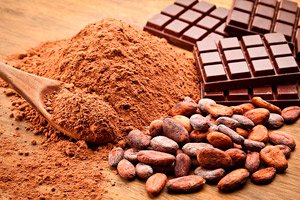
All iLive content is medically reviewed or fact checked to ensure as much factual accuracy as possible.
We have strict sourcing guidelines and only link to reputable media sites, academic research institutions and, whenever possible, medically peer reviewed studies. Note that the numbers in parentheses ([1], [2], etc.) are clickable links to these studies.
If you feel that any of our content is inaccurate, out-of-date, or otherwise questionable, please select it and press Ctrl + Enter.
Cravings for fatty foods when stressed? Cocoa can reduce the negative effects of
Last reviewed: 03.07.2025
 ">
">If you eat fatty foods during stressful situations, drinking cocoa may help you recover faster from the effects of stress, according to a new study.
Stress has a temporary negative impact on the body, and eating fatty foods before or during stress can slow the recovery process. Cocoa contains flavonoids, which appear to protect vascular function from temporary stress-induced impairments that can lead to high blood pressure and other problems.
How does cocoa help with stress?
A study from the University of Birmingham, UK, published in the journal Food & Function, found that drinking cocoa can speed up physiological recovery from stress, even despite eating fatty foods that typically make recovery more difficult.
The flavanol epicatechin found in cocoa helps relax the endothelial layer of blood vessels, improving their function and reducing high blood pressure, a common response to stress.
Study: The Effect of Cocoa on Blood Vessels
The study involved 23 young healthy men and women. Subjects were offered a high-fat meal, accompanied by cocoa with high or low epicatechin content, 1.5 hours before performing an 8-minute stress task.
Vascular function was assessed by measuring the ability of the artery to expand with increasing blood flow (flow-mediated dilation (FMD)) at baseline, 30 minutes, and 90 minutes after stress.
- Participants who consumed high-epicatechin cocoa had lower FMD levels at 30 minutes but significantly improved at 90 minutes, indicating faster recovery.
- There were no differences between groups in other measurements, such as frontal lobe blood flow, carotid artery diameter, and blood pressure.
Why does fatty food make stress worse?
Fatty foods, although tasty, make it difficult to recover from stress.
Dr Catarina Rendeiro, lecturer in nutrition at the University of Birmingham, explains:
"High levels of stress increase the risk of cardiovascular disease by 40%. This is partly due to ongoing impairment of vascular function, which can become chronic."
Fatty foods:
- increase the level of triglycerides and C-reactive protein in the blood,
- reduce the production of nitric oxide by the endothelium, which impairs vascular function.
These effects increase the likelihood of diseases such as hypertension, heart attack or stroke.
How do cocoa flavanols neutralize stress?
Epicatechin, a flavanol found in cocoa, improves the availability of nitric oxide, which helps dilate blood vessels and improve their function.
Other sources of flavanols:
- green tea,
- apple peel,
- berries,
- grape.
Flavonoids are known for their antioxidant and anti-inflammatory properties, making them useful in combating the negative effects of stress.
Cocoa, green tea and berries against stress
Although cocoa does not affect the restriction of blood flow to the brain during stress, its positive effects on the vascular system make it a useful supplement.
Dr. Rendeiro adds:
"If you can't resist fatty foods when you're stressed, add a flavanol-rich food to the mix to minimize the negative impact."
Practical recommendations
To obtain the amount of flavanols equivalent to the study:
- 5.5 tablespoons unprocessed cocoa,
- 2 cups of green tea,
- 300 grams of berries.
Conclusion
While it's best to avoid fatty foods during times of stress, eating foods rich in flavanols, such as cocoa, green tea, or berries, can help mitigate the negative effects of stress and support vascular health.
